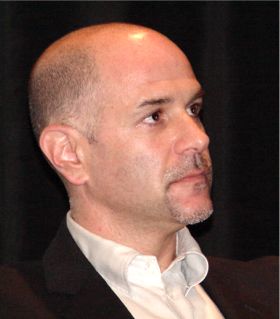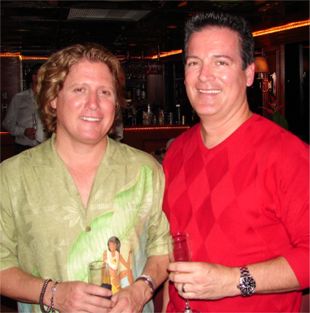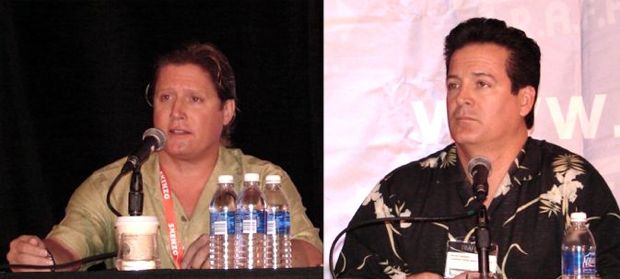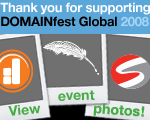|
2007 utilizing a simple
strategy of controlling and building exceptional Internet companies
leveraging the world's best domains, technologies and business leaders."
With
respect to what's coming in 2008 Mann predicted, "More disruption of the PPC and advertising market. More wealthy
domain leaders stepping out from years of shadows and becoming business and community leaders and role
models; including building and managing technology and marketing teams and
non-domain web assets; and leading more on and offline social and nonprofit activities."
| Andrew Miller and
Mike "Zappy" Zapolin of the Internet
Real Estate Group (who were featured in our September
2005 Cover Story) are equally big proponents of development.
Zapolin
and Miller consider the most significant event of 2007 the
filings by domain name based companies and brands, to go public.
"InternetBrands, Creditcards.com, NameMedia to name a few,
have opened up their financials for investors to see and they
are very impressive," Miller said. "With tens of
millions of dollars of EBIT (Earnings Before Interest and Taxes) each, Wall Street is beginning to
realize the power of the modern day Internet/Domain Brand."
Andrew and
Zappy are also very excited about the strong
multiples being paid for private acquisitions of high |
|

Mike
"Zappy" Zapolin
Internet Real Estate Group

Andrew
Miller
Internet Real Estate Group |
quality
Internet businesses, Business.com sold for $350
Million, approximately 23 times EBIT, and Dictionary.com sold for
$100 Million, more than 23 times EBIT. "This further reinforces
the fact that a great domain brand coupled with a great business
has an exponential value," they said.
The
Internet Real Estate guys are encouraged that owners of the very
best generic domain names are interested in partnering with a
development partner like Internet Real Estate Group and
retaining equity, rather than just selling the domain for a big
windfall. "They are realizing the upside and are placing
bets on this. Two examples of this where Internet Real Estate
Group has formed joint ventures with the owners of domains are
DutyFree.com and SEM.com, which IREG is developing into
stand alone brands and businesses," Miller noted.
"There
are so many Internet sole proprietorships or small businesses
that are doing great revenue but desperately need a generic
domain name brand, credibility, and a strong management team. By
having the generic domain name in some of the strongest
categories, we are seeing the crème de la crème of these
businesses before the PE firms or VC’s and are in a position
to acquire, merger, or Joint Venture with them to accelerate
development," they noted.
"2007
was another exciting year for IREG. We brought in Rob Monster as
our third partner, and with that, brought years of brand and
operational experience into IREG. We rapidly developed
Luggage.com and exited the business in 2007 and acquired and
began full scale businesses on Patents.com, Chocolate.com,
Software.com, Phone.com, Jeans.com and Podcast.com. Patents.com
is a strong example of the power of the generic domain name, as
we took a domain
name from date of acquisition, acquired one of the strongest
small businesses in the space and with it a terrific management
team, and closed a Series A term sheet with a major VC, all in
less than 6 months timeframe. This is a model we expect to
duplicate many times in 2008 and beyond," Miller and
Zapolin added.
|
Miller
and Zapolin see the momentum from the second half of 2007
continuing in 2008, with some of the leaders going public and a
“watershed moment” occurring when Art.com files for its
public offering, at which point Wall Street and Investors
realizes that the business that started from a domain name and a
couple of acquisitions is doing hundreds of millions of dollars
in revenues and EBIDTA.
"We also expect to see
continuing investments from new kinds of investors, who are
already jumping into the domain space, given the weakness in the
physical Real Estate market, the risk of the stock market, and
the weak dollar. There will be continued validation that domain
investing is extremely risk averse and continues to have massive
upside for speculators and business builders. The hazards we see
are people or companies delving into lower quality domains,
whether that be secondary TLD’s to dotcom or non intuitive
names that are not strong brands, and continuing to rely solely
on pay per click sites that ultimately provide no end value to
the user," the dynamic duo concluded.
| Any
discussion of development also benefits mightily when Michael
Castello and David Castello of Castello
Cities Internet Network are included. The owners of
PalmSprings.com, Nashville.com, Cost.com and many other great
generics were the subject of one of our most popular cover
stories in December 2006
(by the way here is a little bonus for Castello Brothers fans
that you haven't seen before - a classic
video from their rock & roll days (Michael is on vocals
and David is the drummer). I challenge you to watch this video
and not come away scratching your head as to why these guys
didn't become one of the biggest rock bands of the |
| 80's. Oh
well, the music world's loss was the domain world's gain).
Looking
back at last year Michael had no doubt about the top story,
"The trend toward the development of good quality domain
names into viable sites," he said. "It is one thing to
have thousands of domains that generate PPC but to build a
single site into a money maker takes domainers from being search
engine tools and elevates them into entrepreneurs with power
generated directly from the user/visitor. No one can break that
bond. The power is going from big corporate back to the people.
The internet has facilitated this revolution like never
before,' Michael said. "CCIN has advanced in development
and co-development this year by forging relationships on several
fronts including Cost.com and WorldGolf.com. Those that “get
it” are realizing that the power to build these global
powerhouses can come right from the nest of creativity within
our own ranks." |

Michael
Castello (left) and David Castello
Castello Cities Internet Network, Inc. |
David
added "Domain name development will continue to be the most
important trend for domainers. In the past, parking was
considered the end game for most domain names. Now, it is being
seen as a temporary first step to monetizing a name
before it is developed. 2007 was a great year for the
Castello Brothers and CCIN. In addition to expanding our city
sites such as Nashville.com and PalmSprings.com, we focused
on developing our non-Geodomains such as Whisky.com and
Kennel.com. We also solidified our first outside development
deals with Cost.com and TRAFFICZ, and our Golf Geodomain
portfolio with WorldGolf.com to create the world's largest Golf
Geodomain Network."
Looking
ahead David said, "In 2008, the Enlightenment of
Madison Avenue and Corporate America will begin as they start to
acknowledge the massive synergistic marketing advantages of
adding easy-to-remember, generic domain names to their
advertising portfolios and marketing campaigns. Domain
name values will rise as they enter the market. However, this
will be no love affair - Corporate America will only buy
what they can't take."
"Typosquatters will find themselves squarely in the
crosshairs of litigation as more of Corporate America awakens
to the revenue they've lost and targets anything
they can through present and future typosquatting
laws. Because of this, there will be a shake-up in the
hierarchy of many of those who are now considered the major
domain players. When the dust settles, the pinnacle will belong
to those who successfully developed their names into independent
entities."

Michael
Castello (left) and David Castello speaking at T.R.A.F.F.I.C.
New York - June 2007
"The
importance of the Internalization of Traffic will
become obvious because of domain
development," David noted. "With parked names, the
transference of traffic away from the site was an inherent
characteristic of monetizing via PPC. With a developed name,
keeping viewers on the site will become paramount and
the idea of a site simply being a monetization conduit to
send visitors somewhere else will be seen as ridiculous as
a newspaper, radio or television station sending their
readers, viewers and listeners away to a competitor."
| Michael
said, "The
hazard will come as the “powers that be” will push back in
ways that would make any democracy cringe. That is the way the
game is played in capitalism and we need to work together to
allow the positive properties of the internet to naturally
unfold. We need to be smart in how we position ourselves. We
must protect from being labeled as cyber-squatters which is
being perpetuated in large part by those trying to make a buck
profiting off of legitimate trademarks such as typo-squattering.
This type of practice will paint a broad brush of demonization
to a public that is struggling to understand what we do.
This is the time for the visual brands in our industry to
present ourselves in a positive ways in order to calm the fear
that is out there. Many of the publications like
DNJournal.com and other blogs are |
|

ICA
Legal Counsel Phil Corwin
|
making
good,
concise information available. The public, because they have the
internet at their fingertips, will have the ability to see
clearly the growth and direction of our industry."
Before
we move on to the topic of PPC, the legal challenges that Michael and David bring up make this an appropriate point to
bring in an expert attorney, Phil Corwin, who also serves as the
Washington, D.C. lobbyist and Legal Counsel for the Internet
Commerce Association. Corwin pointed to five developments
that had a big impact on the domain business in 2007:
-
The
RegisterFly fiasco and ICANN's reaction, in which after an
initial state of denial and fumbling it began to take the
concerns of individual registrants more seriously. While
ICANN has taken positive follow-up steps - such as
improving communications and mandating secure data escrow
for all registrars - it remains to be seen whether a truly
improved Registrar Accreditation Agreement (RAA) will
be uniformly implemented and enforced to provide
registrants with the protection and rights they require.
|
-
The
launch of CADNA and the significant possibility that major
corporate interests may seek to push domainers aside in
the online search and advertising business through a
coordinated campaign of negative publicity and trademark
law changes in the US and internationally.
-
The
continued growth of and support for the ICA and the
growing recognition within the domainer community that an
organized and ongoing public policy voice is vital
to
protecting its long-term interests.
-
The
initiation of cybersquatting lawsuits by various major
corporations that seek to use anti-counterfeiting statutes
against alleged cybersquatters. If accepted by the courts,
this tactic could dramatically increase (by a factor of
10) the potential fines faced by domain registrants and
expose them to various legal strongarm tactics (without
the inconvenience of getting Congress to amend trademark
law) - increasing the potential for reverse
name hijacking.
-
The
implementation by ICANN of a national law exception policy
that will permit accredited registrars to have national
privacy protection laws preempt their WHOIS obligations.
While this particular exception benefits registrants, it
may mark the beginning of the unraveling of RAA
uniformity, a development that could hurt registrants in
other ways and that could also encourage the establishment
of offshore "privacy havens" that become legal
shelters for cybersquatters.
| We
also asked Corwin what he saw coming around the bend in 2008 and
he provided these bullet points:
|
-
Advertising
flows online increase dramatically - increasing the clout
of the domain industry but also its vulnerability to
attack by interests seeking to usurp it in the battle for
online search and advertising dominance.
-
The
possibility of punitive CADNA-launched trademark law
legislative initiatives and lawsuits that seek to assign
domainers to permanent second class status in the law and
the marketplace.
|

Corwin
at T.R.A.F.F.I.C. New York
June 2007 |
- General
economic downturn and continued restrictions on
credit availability in the US and worldwide -
it should help online advertising and e-commerce
overall, compared to traditional media and physical
retailers; among domainers, those with cash will be
king while highly leveraged players will face
trouble.
|
-
The
troubling possibility that more UDRP decisions will find
domain parking to be a questionable activity that is not
viewed as sufficient development to fend off a dispute
complaint.
|
Coming
Up Next on Page 3 of DN
Journal's Jan. 2008 State of the Industry Report
-
Michael
Gilmour on the Past, Present and Future of PPC
-
Blog
Booster Jay Westerdal Forecasts Ron Jackson's Fate in '08
-
T.R.A.F.F.I.C.
Co-Founder Howard Neu Stirs the Conference Cauldron
-
Domain
King Rick Schwartz Clears the Bases and Closes The Show
Continue
to Page 3
|





















